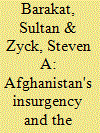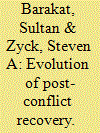| Srl | Item |
| 1 |
ID:
094843


|
|
|
|
|
| Publication |
2010.
|
| Summary/Abstract |
The international intervention in Afghanistan has contributed to entrenched state weakness and rising insecurity. Despite increased references to the need for reconciliation with the Taliban and a political solution to the ongoing conflict in Afghanistan, few specifics have been offered by academics or policymakers. Building on research into conflict resolution and an analysis of the composition and motivation of the insurgency, this article addresses this gap by asking whether conditions are currently "ripe" for a negotiated settlement, how "ripeness" may be achieved, and, once achieved, how a political settlement might best be pursued.
|
|
|
|
|
|
|
|
|
|
|
|
|
|
|
|
| 2 |
ID:
090204


|
|
|
|
|
| Publication |
2009.
|
| Summary/Abstract |
Recent history has been marked by the rise of post-conflict intervention as a component of military and foreign policy, as a form of humanitarianism and as a challenge to Westphalian notions of state sovereignty. The terms of debate, the history of the discipline and the evolution of scholarship and practice remain relatively under-examined, particularly in the post-9/11 period in which post-conflict recovery came to be construed as an extension of conflict and as a domain concerned principally with the national security of predominantly Western countries. The subsequent politicisation of post-conflict recovery and entry of post-conflict assistance into the political economy of conflict have fundamentally changed policy making and practice. The authors argue that research into post-conflict recovery, which must become increasingly rigorous and theoretically grounded, should detach itself from the myriad political agendas which have sought to impose themselves upon war-torn countries. The de-politicisation of post-conflict recovery, the authors conclude, may benefit from an increasingly structured 'architecture of integrated, directed recovery'.
|
|
|
|
|
|
|
|
|
|
|
|
|
|
|
|